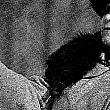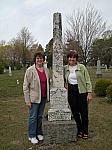Becoming a Reporter
by Etta S. Wilson
One cold blustery morning in a March long gone by as I was walking down Monroe street wondering if there was any way in which a woman might earn an honest living outside of sewing or teaching school, both of which I had tried and hated, I met Lloyd Brezee. We exchanged greetings and acting upon what seemed to be a sudden impulse, he asked me to step into a near-by doorway out of the wind, when he immediately offered me a position on the Telegram-Herald, at that time a mere struggling infant of a newspaper having to be trundled along very carefully, but now the successful Grand Rapids Herald. I accepted the position instantly without mention of salary or the number of hours of daily labor, and I admit that the salary proved to be exceedingly small while the hours of work were most liberal.
At that time women were unknown in the editorial rooms of the newspapers. There was no society column or anything approximating it, but Mr. Brezee being a man of novel ideas and revolutionary notions, proposed to start one and he outlined his plan to me.
The first three weeks that I spent in the toils of the newspaper office are unforgettable. I did not know just what to do or how to do it and Mr. Brezee, at that time managing editor, could not tell me. It was just one of those things that had to be worked out. Previously all personal items had been confined to the goings and comings of men in the business world and it was a ticklish task to tackle when mention was made of the travels of society women. For a time items for the "society column" as Mr. Brezee elected to name it, were brief statements of travel and business trips and the first time mention was made of an evening party in one of the exclusive homes in Grand Rapids, a storm of great violence raged over the Telegram-Herald offices and centered upon my inexperienced head. It seemed, at least so we were informed, that it was a scandalous thing for a newspaper to print anything about an affair in a private home, a matter that could not possibly concern anyone except "those present."
However, having elected to run a department of that kind we proceeded to do it and by exercising some care we managed to increase the scope of our column and also to retain the good will of those who had been progressive enough to see daylight coming and sensible enough to bask in its kindly light. The society column became a leading feature of the paper and very popular, yet it was a small effort measured by the society departments of the daily newspapers of today. One whole column seemed wonderful grist to me and had any one told me that later I would "handle" 14 columns of society news as I had to do on the Detroit News, it would have been unbelievable.
Of course my efforts while in the employ of the Grand Rapids Herald were not confined to the society page. I did general reportorial work accepting assignments in every line of human endeavor. For a number of years I was police and court reporter; and at various times I filled, I believe, every department in the editorial division. I edited state and political news, telegraph, sports, etc., writing as occasion demanded, anything needed from the leading editorial down to the fall of a respected business man. I reported the wonderful $10,000 horse race between Nelson and Allerton, the two great stallion kings of their day; interviewed Susan B. Anthony on woman suffrage and reported a swell wedding all within the limits of a day's work. Reporters certainly worked in those days and I was not the only diligent one in the game in Grand Rapids. Newspapers paid small salaries and employed few reporters so one had to work at lightning speed while on the run from one assignment to another.
The one thing which contributed more to my success in the society field than anything else, I believe, was the fact that I had gone to school in Grand Rapids and had a wide acquaintance with the young matrons in the very best circles. After their first astonished gasp over the exploitation of their big and little parties they seemed to enter into the spirit of it and many would go out of their way to give me help in the matter of picking up items here and there. Some timidity was exhibited at first but this eventually gave way to a sensible view of newspaper mention. One lady said to me, "I love to read about the affairs of other people, so why shouldn't I let them read about mine?" and this spirit spread and grew so that I eventually had help from the most exclusive quarters.
I will never forget one of the early experiences in trying to get an item from a little "circle within a circle." I heard a rumor that some one was planning to do something very grand and unusual, but no one seemed able to speak with authority about it. I went first to the then president of the Ladies' Literary club, a liberal minded woman who had often given me good items, but she said, "Oh, my dear, I cannot tell you a word about that. Go and see Mrs. So and So, I think she knows all about it." But she added that Mrs. M. J. Smiley, at that time leader of the local four hundred, could tell if she would.
So I went up to 300 Cherry Street and rang the Smiley door bell and when the maid came to the door gave her my card. She invited me in, told me to be seated and then disappeared upstairs. In a few minutes Mrs. Smiley, lovely, gracious and cordial as her name, came down and we had a good old heart to heart conference which made us friends for life. She was a progressive woman and because I was doing something new in the line of women's work she was wonderfully interested. She told me all I wished to know and gave me much news in addition and when I departed she reminded me again to come to see her whenever I felt that she could help me in any way.
I had determined from the beginning to make myself competent to report every sort of news for I aspired to be a general all-around reporter and I did not want any managing editor to feel that there were cases where I could not be sent because I was a woman. With this end in view I bought a book of baseball rules and studied it diligently. Whenever possible I went out to the ball game and watched it carefully hoping to learn it sufficiently well to report a game should occasion demand. The chance came about as soon as I was fitted for it. L. F. Williams, managing editor of the Herald, had sent every one of the men out on assignments and he and I were alone in the office. He was grinding away on an editorial and I was editing state news when suddenly he looked up and said, "My God, there is a ball game this afternoon and every man is out, there is no one to take it."
"Well," I said, "Why don't you go out there yourself?"
"Dear lady," he said, "I don't know a thing about baseball.
"I'll go," I said.
"You," he snorted.
"Yes, I."
"What good will that do the paper," he asked scornfully.
"I know I can report it," I said, "and if you will let me go out there, I'll show you."
So I went and often thereafter I was called upon to write sports since in those days there were no sporting editors on the Herald.
It is certainly a pleasure to review the old days in the newspaper offices or any part of them but since a dreadful illness which resulted in a complete alteration in my mode of life, I have never gone back to the work although my pen has never been wholly idle. When I learned that although I would recover I would go about with my head drawn back through shortening of the cords of the neck from the poisoning resulting from the bite of a gnat, I had my bad hour. I felt that I was through with the activities of life and that hereafter I would have to sit on the side lines. With my head drawn back, what could I do? Not newspaper work surely, but as I pondered it came to me like a flash, I could study birds.
So I took up the study of birds with no other thought than that it would fill a gap in a life which had always been in touch with the things that count, the big things. I had no thought of making money. I felt that money making was a closed chapter in my life. Returning health brought renewed energy. In my study of birds I followed the flitting creatures from the Atlantic to the Pacific, from Lake Superior to the Gulf of Mexico, from Florida to Alaska, seeking to know at first hand the secrets of their lives and their ways of living under different conditions. Ornithologies supplanted every other form of reading except the daily papers. I came into touch with others who were devoting their lives to bird study and soon found myself reporting migration and other phases of avian life to the Biological Survey at Washington and when a chance came to me to make more money than I had ever made in the newspaper game by lecturing on the conservation of bird life, I was surprised to find myself fitted for it, and was engaged as national lecturer by a New York bureau.
Since then I have been busy and happy.
The deformity? Oh, it is gone. I overcame that long ago.
Excerpted from Reminiscences of Editors and Reporters by Arthur S. White, 1921

 facebook
facebook




